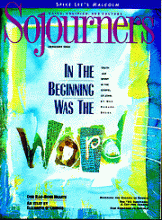THE LINES AT OUR LOCAL polling place stretched way outside, down the block, and around the corner. From the reports I've heard in the days after the election, that scene was repeated all across the country.
The pundits point to the now-famous sign at Clinton headquarters as defining the major single issue of this presidential campaign: "The economy, stupid." But the underlying themes and tensions during the election point deeper than the obvious reality of Bush's failed economic policies. During this election year, the word on most people's lips was "change."
That hunger for change among the American people may be the most important lesson to be learned from this election. This most unusual political season revealed a longing in the country for a new kind of politics that is more connected to people's lives and values. The public clamor for change set the stage for all the candidates' efforts to be elected—in Ross Perot's brash promises to end the "gridlock," in the populist rhetoric of Bill Clinton, and even in the desperate attempt of George Bush to pledge that things would be different.
Read the Full Article
